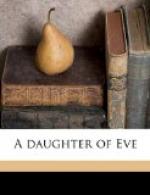“My friends,” he said, “you know my relations with Florine; you also know my life, and you will not be surprised to hear me say that I am absolutely ignorant of what a countess’s love may be like. I have often felt mortified that I, a poet, could not give myself a Beatrice, a Laura, except in poetry. A pure and noble woman is like an unstained conscience,—she represents us to ourselves under a noble form. Elsewhere we may soil ourselves, but with her we are always proud, lofty, and immaculate. Elsewhere we lead ill-regulated lives; with her we breathe the calm, the freshness, the verdure of an oasis—”
“Go on, go on, my dear fellow!” cried Rastignac; “twang that fourth string with the prayer in ‘Moses’ like Paganini.”
Raoul remained silent, with fixed eyes, apparently musing.
“This wretched ministerial apprentice does not understand me,” he said, after a moment’s silence.
So, while the poor Eve in the rue du Rocher went to bed in the sheets of shame, frightened at the pleasure with which she had listened to that sham great poet, these three bold minds were trampling with jests over the tender flowers of her dawning love. Ah! if women only knew the cynical tone that such men, so humble, so fawning in their presence, take behind their backs! how they sneer at what they say they adore! Fresh, pure, gracious being, how the scoffing jester disrobes and analyzes her! but, even so, the more she loses veils, the more her beauty shines.
Marie was at this moment comparing Raoul and Felix, without imagining the danger there might be for her in such comparisons. Nothing could present a greater contrast than the disorderly, vigorous Raoul to Felix de Vandenesse, who cared for his person like a dainty woman, wore well-fitting clothes, had a charming “desinvoltura,” and was a votary of English nicety, to which, in earlier days, Lady Dudley had trained him. Marie, as a good and pious woman, soon forbade herself even to think of Raoul, and considered that she was a monster of ingratitude for making the comparison.
“What do you think of Raoul Nathan?” she asked her husband the next day at breakfast.
“He is something of a charlatan,” replied Felix; “one of those volcanoes who are easily calmed down with a little gold-dust. Madame de Montcornet makes a mistake in admitting him.”
This answer annoyed Marie, all the more because Felix supported his opinion with certain facts, relating what he knew of Raoul Nathan’s life,—a precarious existence mixed up with a popular actress.
“If the man has genius,” he said in conclusion, “he certainly has neither the constancy nor the patience which sanctifies it, and makes it a thing divine. He endeavors to impose on the world by placing himself on a level which he does nothing to maintain. True talent, pains-taking and honorable talent does not act thus. Men who possess such talent follow their path courageously; they accept its pains and penalties, and don’t cover them with tinsel.”




